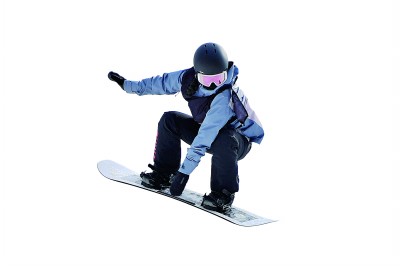Snowboarding and surfing on the snow.
[How much do you know about the Winter Olympics]
■ Rules
Snowboarding is a relatively young skiing event that uses skis to slide down a snowy slope. During its development and formation, snowboarding is influenced by skateboarding and surfing. In the 2022 Beijing Winter Olympics, there were 11 events in snowboarding, including parallel giant slalom, single board obstacle pursuit, U-shaped field skill, slope obstacle skill, men’s and women’s events on the big platform and mixed groups of obstacle pursuit. Among them, the obstacle chasing mixed group event is a new event in Beijing Winter Olympics.

Cartography: Guangming Daily reporter Wang Jinwen
Finishing: Guangming Daily reporter Wang Wenjing
There are two scoring methods for snowboarding. U-shaped court skills, slope obstacle skills and big platform events are all scoring items of the judges, and the judges will score the players according to the skill difficulty, execution degree, skill range, take-off and landing posture of each slide. Obstacle chase and parallel giant slalom are racing events, and the one who reaches the finish line first will win the race.
■ Historical remarks
Snowboarding first emerged in the United States in the 1960s, which was related to skateboarding and surfing. A skier named Popper made a snowboard for his children after imitating the surfboard on the sea, and named it "Snafel", which means surfing on the snow. Later, this kind of snowboard began mass production, but in 10 years, this kind of snowboard has been sold as a toy for children and teenagers on the snow.
What is decisive for the development of snowboarding and the formation of events is the participation of alpine skiing, freestyle skiing and land skateboarders. They introduced some techniques, skills and sports forms of alpine skiing, freestyle skiing and land skateboarding into snowboarding, such as the gyration of alpine skiing, the snow skills and aerial skills of freestyle skiing and the "U"-shaped pool skills of land skateboarding, so that snowboarding gradually formed an independent competitive event. In 1980, under the organization of the American Ski Federation, the first snowboarding competition rules were formulated, and the first international snowboarding competition was held in the United States in 1983. With the formal establishment of the International Skateboarding Federation in 1990, the number of people engaged in snowboarding has gradually increased, which has promoted the development of snowboarding to some extent.

In March, 2021, the women’s team of the national snowboarding grand platform and slope obstacle skill championship from 2020 to 2021 was held in Changbai Mountain, Jilin Province. Xinhua news agency
■ Watch.
Snowboarding embodies freedom, boldness and innovation, which always makes people full of snow-like reverie, and all the snow trails depict the romance of youth.
During the competition, the athletes’ natural and unrestrained skill display is a major attraction of snowboarding competition. In the "U" pool competition of snowboarding, in order to get higher scores, on the premise of ensuring speed, athletes often show difficult, skillful and exciting technical movements, and their smooth downhill and eye-catching movements often attract applause and applause from the audience.
During the competition, there was a fierce contest among the athletes. In the first race of snowboarding obstacles, four or six athletes jumped out like arrows after falling off the partition. Since then, the audience’s eyes have followed the athletes closely and they have no time to look after them, and their mood has been constantly fluctuating as the athletes quickly slide down between various combinations of obstacles. It is an excellent visual feast to watch the athletes chase after each other fiercely, but also to take into account obstacles and timely jumps.
This column is written by Chai Rujin, reporter of Guangming Daily, Gu Yuqing and Liu Jialin, correspondents of Li Yulan Guangming Daily, and compiled from the official website of the International Olympic Committee and the Guide to Winter Olympics Events and Watching Games (edited by Li Shuwang and Zhang Lei). "Historical Story" was written by Cui Lequan, distinguished professor of Zhengzhou University.
Academic guidance of this edition: Professor Qiu Zhaoyi of Beijing Sport University.
Guangming Daily (February 14, 2022, 09 edition)
Source: Guangming Net-Guangming Daily